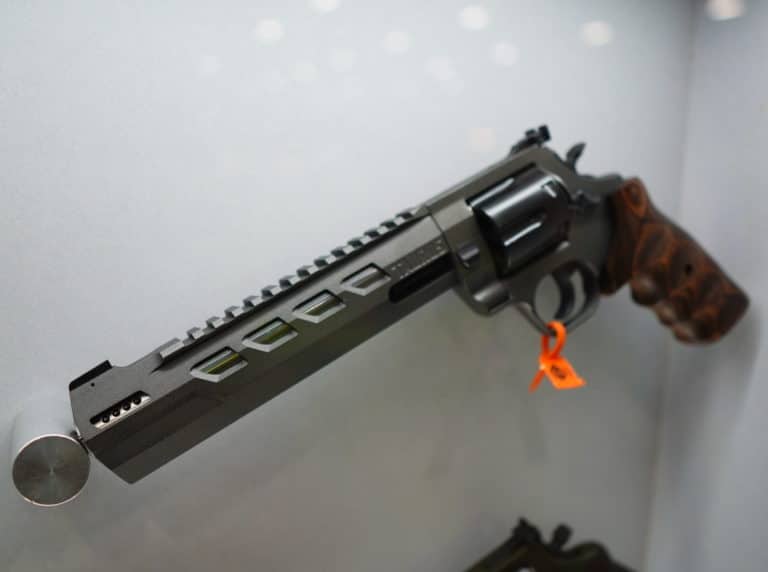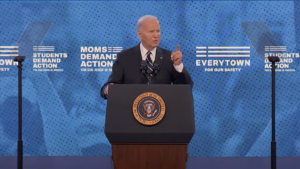There’s now a genuine possibility the President’s son could be one of the country’s next big Second Amendment plaintiffs. Moreover, he stands a solid chance of winning.
Earlier this week, Special Counsel David Weiss announced that his office intends to seek a federal indictment against Hunter Biden before the end of the month. The filing, spurred by the collapse of a plea deal with the Department of Justice last month, specifically aims to charge Biden for violations of federal firearms law relating to his acquisition and possession of a handgun at a time he admitted he was addicted to crack cocaine.
“The Speedy Trial Act requires that the Government obtain the return of an indictment by a grand jury by Friday, September 29, 2023, at the earliest. The Government intends to seek the return of an indictment in this case before that date,” the filing reads.
Depending on the specific nature of the eventual charge(s), it seems likely that the junior Biden will face potential prison time for violating a statute for which his father recently increased criminal penalties. Adding to the intrigue, his lawyers have already pledged to challenge any federal gun charge Hunter might face under the Second Amendment.
Should that happen, Biden stands a distinct possibility of not only succeeding—avoiding a felony conviction and possible jail time—but also adding to a growing body of Second Amendment jurisprudence whittling away at federal firearms prohibitions.
Ever since the Supreme Court handed down its decision in New York State Rifle and Pistol Association v. Bruen last June, courts across the country have been split over the constitutionality of prohibiting the purchase and possession of firearms by unlawful drug users.
At least two federal district courts and a federal appellate court have all ruled against the ban—primarily, though not exclusively, as it relates to marijuana. In each case, the judges reviewing the evidence determined that the nation’s historical tradition of gun regulation did not support a categorical ban on gun ownership for substance use–a key requirement of the test laid out in Bruen.
“In short, our history and tradition may support some limits on an intoxicated person’s right to carry a weapon, but it does not justify disarming a sober citizen based exclusively on his past drug usage,” Fifth Circuit Judge Jerry E. Smith, a Ronald Reagan appointee, wrote for a unanimous panel in U.S. v. Daniels. “Nor do more generalized traditions of disarming dangerous persons support this restriction on nonviolent drug users.”
In each case, the federal government cited colonial-era laws in places like Virginia and New York that prohibited publicly carrying and discharging firearms while intoxicated or during New Year’s celebrations. Each judge found those comparisons inadequate because, unlike those historical examples, current federal law covers anyone who has habitually used an unlawful controlled substance.
“The Virginia law prevented individuals from using firearms while actively intoxicated, while § 922(g)(3) prevents users of intoxicants from possessing firearms altogether,” U.S. District Judge Kathleen Cardone, a George W. Bush appointee, wrote in U.S. v. Connelly.
The latter, she said, would be like if modern DUI laws were changed to “prevent individuals from possessing cars at all if they regularly drink alcohol on weekends.”
The judges also bristled at the notion that drug users fell into a broader category of “dangerous” or “unvirtuous” people such as felons, rebels, the mentally ill, and disfavored minority groups that faced many Founding and Reconstruction-era restrictions on firearms rights and other liberties.
“At argument, the United States pointed to a variety of rather ignominious historical restrictions that it argues demonstrates a historical tradition permitting legislatures to disarm those whom the legislature views as ‘untrustworthy’: namely, slaves, Indians, Catholics, and loyalists,” U.S. District Judge Patrick Wyrick, a Trump appointee, wrote in U.S. v. Harrison. “Since Congress could equally view drug users as ‘untrustworthy,’ so the argument goes, then these historical regulations provide constitutional cover for § 922(g)(3). The United States’ reliance on these laws is concerning, but in any event, they do not support the constitutionality of § 922(g)(3).”
Importantly, however, not every judge has viewed the issue the same way. At least two federal district judges, including one as recently as last month, have ruled to uphold the federal gun prohibition for drug users as constitutional.
U.S. District Judge Alan Albright, a Donald Trump appointee, ruled last December that unlawful drug users were not even covered by the plain text of the Second Amendment because they are not “law-abiding.”
“The decision in Bruen provides clear insight into the meaning of ‘the people’ which the Second Amendment protects. As one Circuit Court has noted, the majority in Bruen consistently explains that the holders of Second Amendment rights are ‘law-abiding’ citizens,” Judge Albright wrote in U.S. v. Sanchez.
Another federal judge, C.J. Williams in the Northern District of Iowa, disagreed with that analysis but still came to the conclusion that the federal gun ban was lawful based on a historical tradition of withholding rights from citizens based on criminality.
“The Court finds that Section 922(g)(3) does not violate the Second Amendment on its face and therefore denies defendant’s motion to dismiss,” Williams, another Trump appointee, wrote last month in U.S. v. Grubb. “In arriving at this conclusion, the Court first finds that Section 922(g)(3) implicates conduct protected by the Second Amendment. Second, the Court concludes that Section 922(g)(3) is consistent with this Nation’s traditional regulation of possession of firearms by criminals.”
Judge Williams took direct aim at the historical analysis of other federal courts who ruled to strike down the law, particularly on the subject of “dangerousness,” stating that he found those decisions to be incorrectly narrow in their view of history.
“The Court has reviewed these non-binding decisions and, with respect, simply disagrees with the narrow view these courts took of the historic precedent of regulating firearm possession by dangerous and unlawful citizenry,” he wrote. “The Court is persuaded that Section 922(g)(3) is a constitutional restriction consistent with historical tradition.”
Given that the federal judiciary has been so split on the issue, an eventual Hunter Biden Second Amendment challenge to his imminent criminal charges won’t be a slam dunk either way. Overall, more judges have upheld the drug user gun ban than ruled against it since Bruen. Still, the only appeals court to examine the issue in that time has found the prohibition unconstitutional. Furthermore, the ruling in Sanchez cited heavily to pre-Bruen cases in support of its decision, as well as to the district court ruling that was explicitly overturned by the Fifth Circuit in Daniels.
That bodes well for Hunter Biden and his legal team should it come to a constitutional claim. Ultimately, though, his fate may be determined, like so much else in the current Second Amendment legal landscape, by what the Supreme Court says on the matter.
CORRECTION 11:22 AM EASTERN 9-11-2023: This piece has been corrected to show more federal decisions have come down in favor of the drug user gun ban than against it since Bruen.






